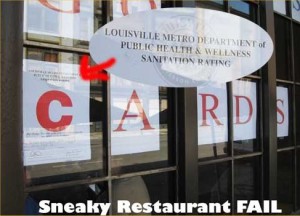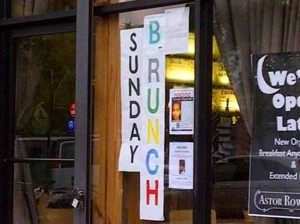A couple of years ago a colleague at the vet college shared a story with me about restaurant grades. He and his son went into a local sushi place and it was dead – they had no problem getting a seat during the usually busy lunch rush. He asked the manager what was up and she said that business had been down since they had been given a low score during a routine inspection. That made my friend pause a bit; they still ordered lunch and ate, but hadn’t been back.
I guess some folks do make choices based on posted restaurant grades.
And that’s why some restaurants do their best to hide a placard with a poor score. According to the the Pittsburgh Post-Gazette hiding a score with cost you $800.
It’s easy to understand why the owner of Chinatown Inn might be embarrassed by the yellow Consumer Alert decal that was prominently posted on the front window of his Downtown restaurant in late July for a string of serious food safety violations.
But an effort to hide the warning from customers behind two strategically placed potted plants backfired when the Allegheny County Health Department discovered the cover-up and slapped him with an $800 fine.
The next day, a Friday, an off-duty health department inspector who had issued the alert was passing through the area around 9:30 p.m. and noticed the warning was being blocked by a large potted palm plant positioned outside on the sidewalk. Another potted palm in the vestibule was pushed against the window, obscuring the alert from the inside.
The inspector snapped a photo to document the scene.
During a follow-up visit on Monday, the inspector replaced the yellow alert sticker with a green “inspected and permitted” placard after finding that most of the serious violations had been fixed. In his report, he noted that the alert had been concealed. A few days later, a fine was issued.
Here are a few more of my favorites.



